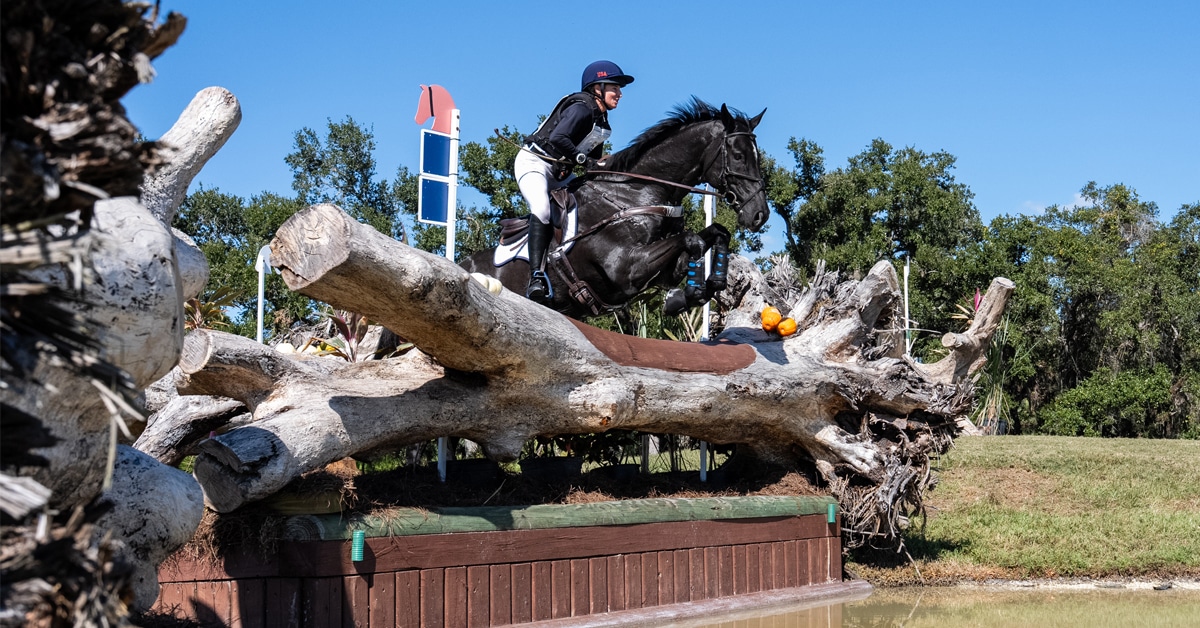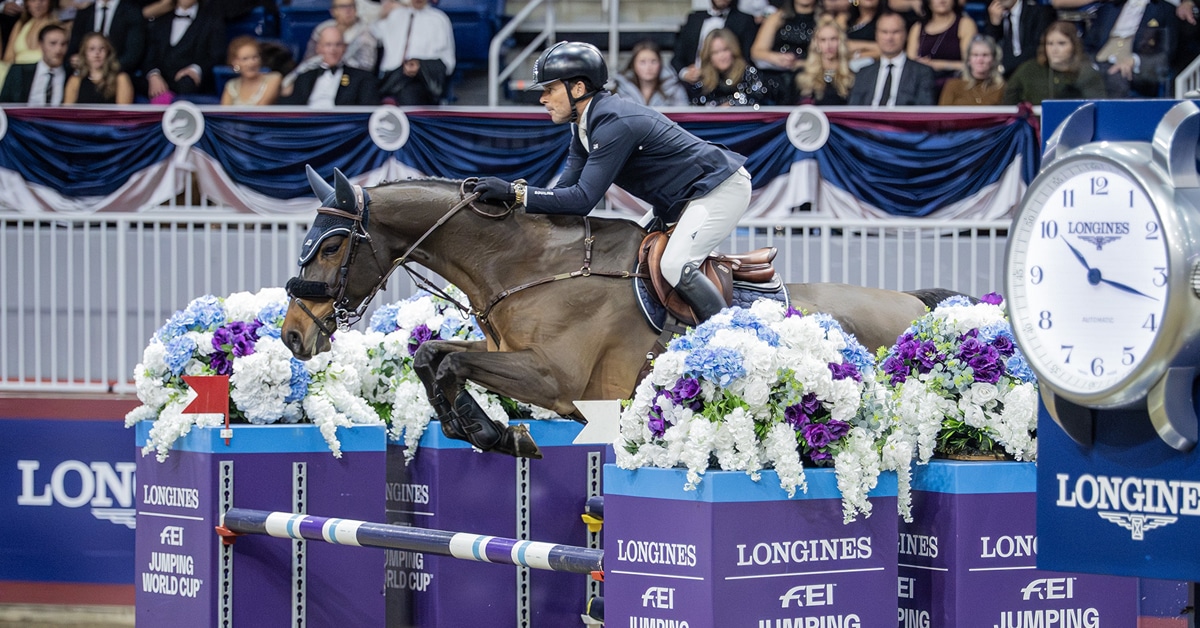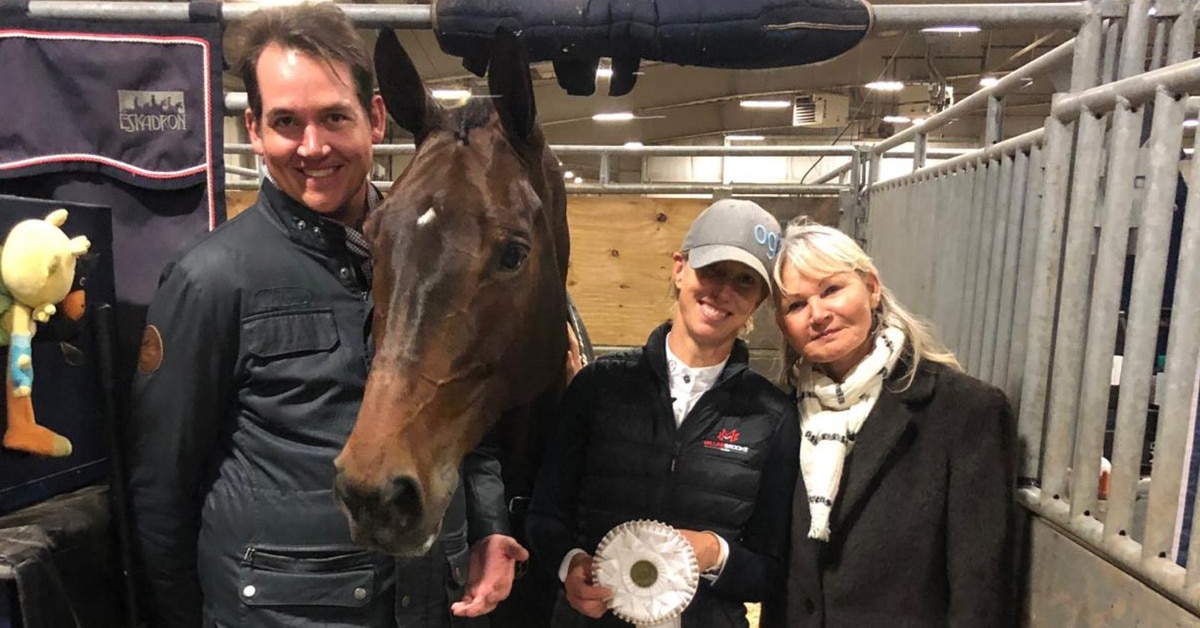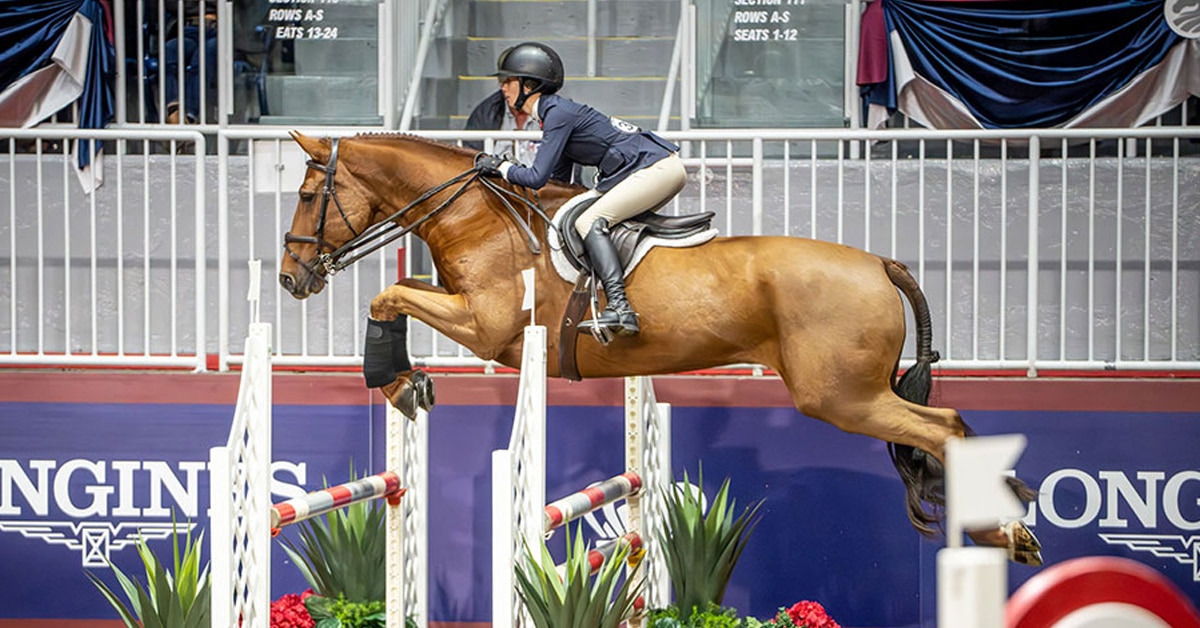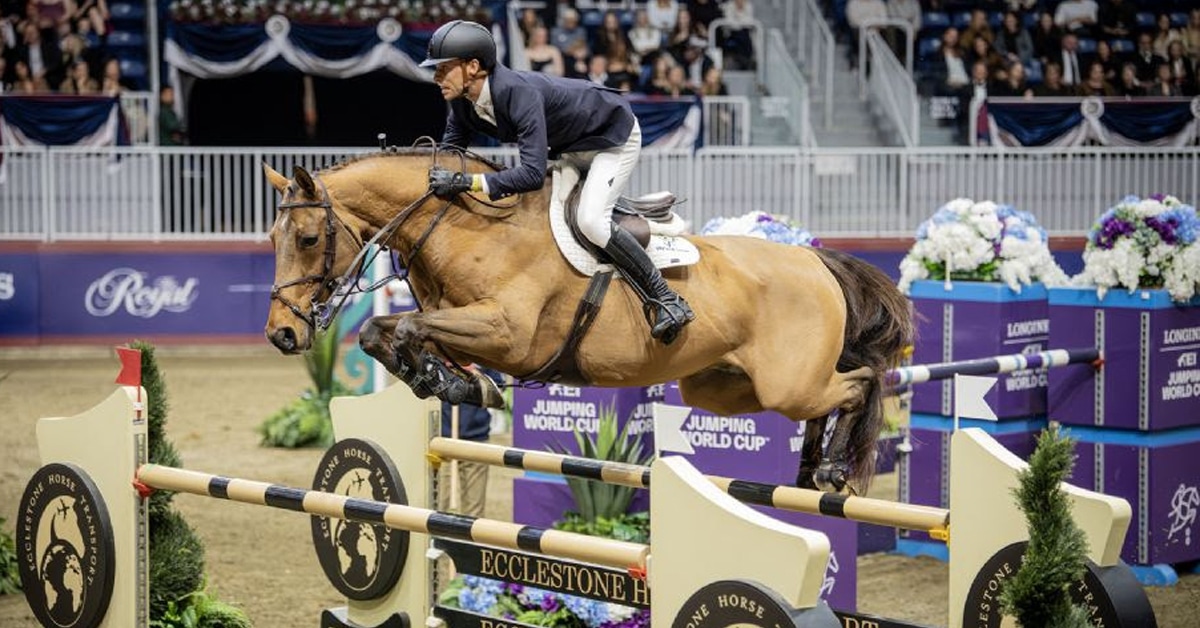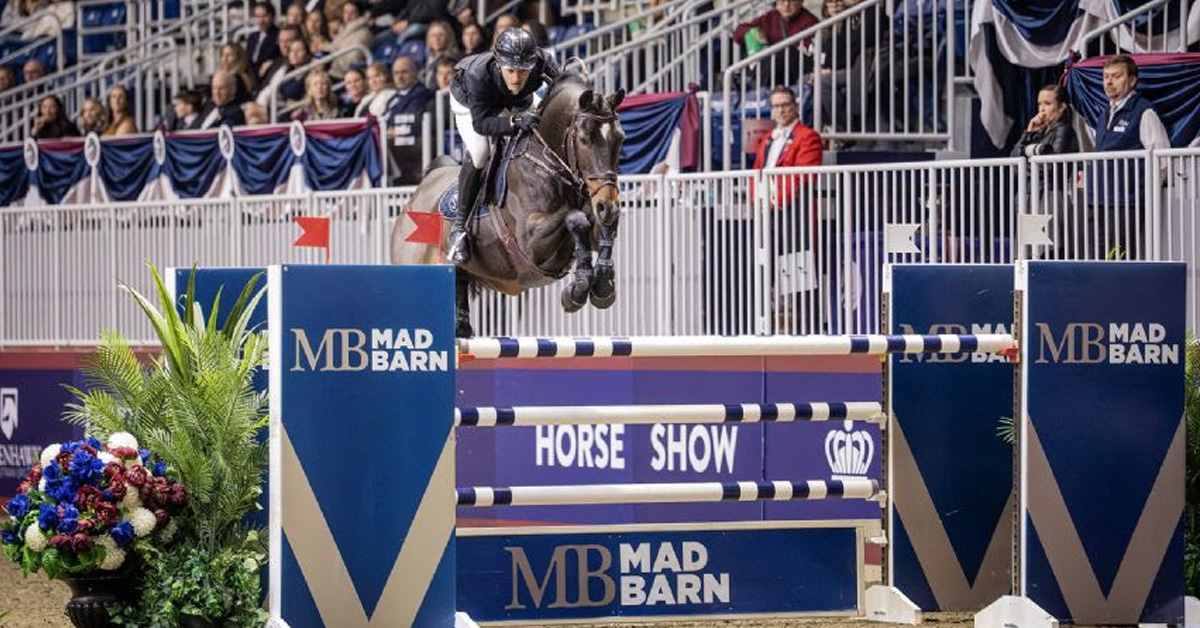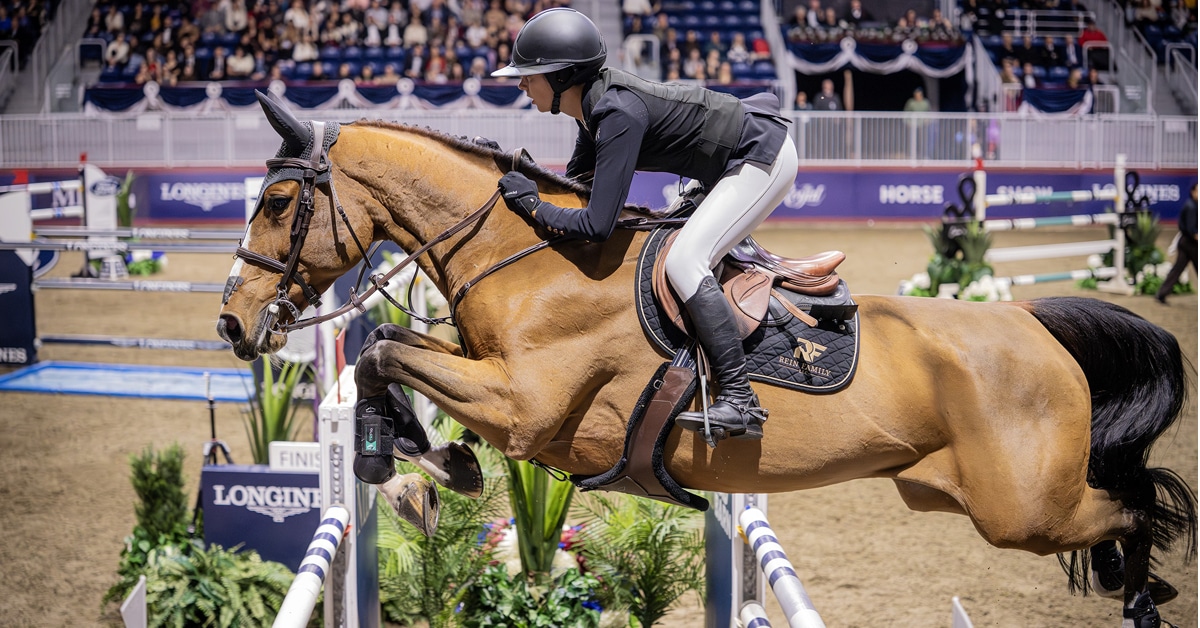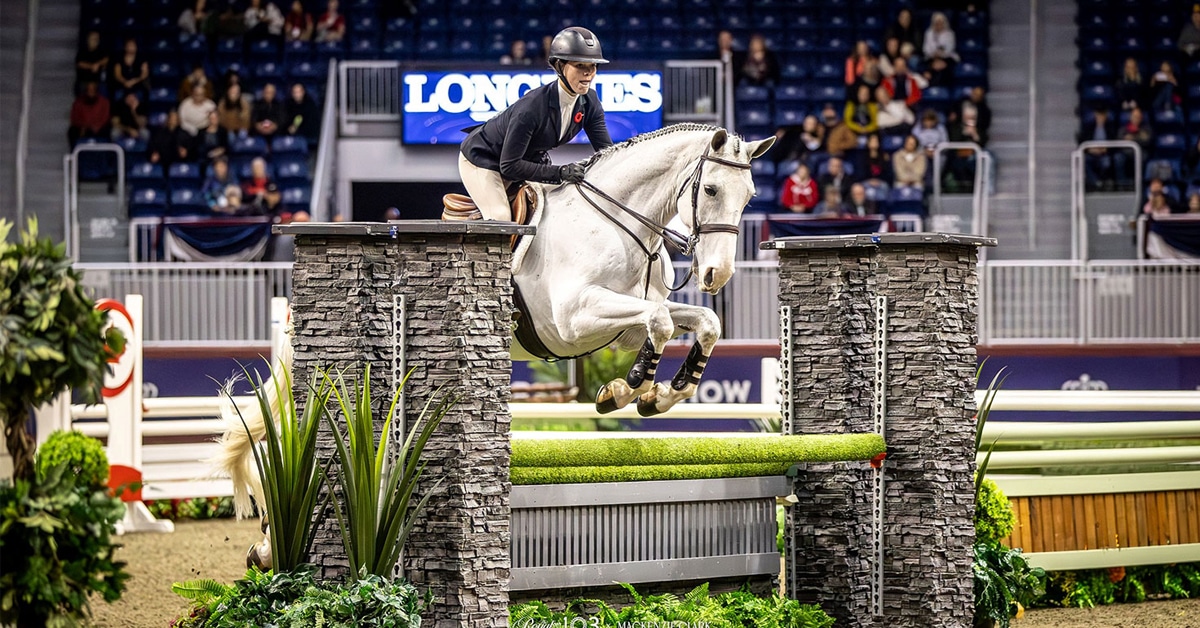The FEI will be hosting its presidential election on December 14th in Baku, Azerbaijan as part of the General Assembly. After serving the FEI for two terms, HRH Princess Haya opted not to serve a third term and six candidates declared interest in the position (Javier Revuelta del Peral of Spain withdrew his candidature on November 12th leaving five candidates). Horse Sport asked each of the candidates the same 10 questions on a variety of topics that are at the heart of equestrian sport. Following you will find a brief bio of each, a link to any additional information they supplied, and their answers.
Meet the Candidates

Ingmar De Vos
Ingmar De Vos, 51, is proposed by the Belgian Equestrian Federation. De Vos holds degrees in political science, business administration and international and European law and started his career as an advisor to the Belgian Senate. He joined the Belgian Equestrian Federation as managing director in 1990, and held the additional role of Secretary General from 1997 to 2011. He was Secretary General of the European Equestrian Federation from 2010, the year the organisation was formed, until 2011. During his time at the Belgian National Federation, De Vos was chef de mission for the Belgian Equestrian Team at all FEI World Equestrian Games™ from 1990 to 2010 and at several Olympic Games. De Vos has been FEI Secretary General since May 2011.

Pierre Durand
Pierre Durand, 59, is proposed by the French Equestrian Federation. Durand holds a degree in business law, is a former professional rider and wine grower. He was Olympic Jumping champion at the 1988 Seoul Games with the 13-year old gelding Jappeloup. He also competed in the 1984 Los Angeles Olympic Games and became European Jumping champion in 1987. He won many other international and national titles. From 1993 to 1998 Durand was President of the French Equestrian Federation. He has held various executive positions in the media industry and is currently chairman of the board of directors of the French National Institute for Sport, Expertise, and Performance (INSEP).

Pierre Genecand
Pierre Genecand, 64, is proposed by the Swiss Equestrian Federation. A businessman, banker and insurance broker by profession, Genecand served as President of the Geneva International Horse Show from 1989 to 2003. He has been a member of the board of the World Cup of Horsemanship, the Alliance of Jumping Organisers, and the Committee of Swiss Top Sports. He is the current President of the Polo Club Gstaad and the Hublot Polo Gold Club.

Ulf Helgstrand
Ulf Helgstrand, 63, is proposed by the Danish Equestrian Federation. A medical doctor by profession, Dr. Helgstrand is a professor of vascular surgery. He has served as President of the Danish Equestrian Federation since 2003. He was board member and Vice President of the Danish Warmblood Association for 10 years and currently serves as Vice President and charter member of the European Equestrian Federation. Dr. Helgstrand is a former Dressage rider and has run a stud with several approved Dressage stallions since 1991.

John McEwen
John McEwen, 69, is proposed by the British Equestrian Federation. A qualified veterinary surgeon with wide international experience, McEwen served as veterinary surgeon to the British Show Jumping and Dressage Teams until the London 2012 Olympic Games. He was vice chairman of the FEI Veterinary Committee from 1999 to 2003 and has been the Committee’s chair since 2006. He currently chairs the FEI Prohibited Substances List and Laboratory Groups. McEwen has served on an advisory panel for World Horse Welfare for more than 15 years. He represents the FEI at the World Organisation for Animal Health specialising in horse transport issues and on the International Sports Horse Federation. McEwen was appointed FEI 1st Vice President in 2010.

Javier Revuelta
Javier Revuelta withdrew his bid and provided this rationale for the decision. The 57-year-old was proposed by the Spanish Equestrian Federation. Revuelta is a lawyer and attorney at law for the Spanish government. He has held senior management positions at various Spanish and international companies in the telecommunications, media, food, financial, and renewable energy industries. Revuelta has competed nationally and internationally in Eventing and Jumping. He participated in the Eventing competition in the 1996 Atlanta Olympic Games, was a member of the Spanish Eventing team at the FEI World Equestrian Games™ 1994 and at the FEI European Championships the following year. Since 2005 Revuelta has served as the chairman of the Spanish Equestrian Federation and is a member of the Spanish Olympic Committee. He breeds and owns racehorses.
1. What do you think needs to be done to attract more sponsors and owners to support FEI competitions and competitors?
Ingmar De Vos – I believe that attracting more sponsors and owners to support FEI competitions and competitors begins with better promoting our sport. If we want to promote our sport in the best way possible, we need to make the sport accessible, exciting and easy to understand for a larger audience. This may mean that our competition formats need to be adapted for modern television and digital media. We need to have the courage to look at our competition formats with unbiased, open minds. We also need to ensure that everything possible is done to further promote the sport through new technologies, graphics and applications that are exciting for spectators. If we can further increase the popularity of our sport, we will be able to get more people such as sponsors, owners and others interested in investing in it
Pierre Durand – My idea is to build a sustainable economic pattern, providing support to emerging countries and facilitating equestrian events.
It is essential not only to develop the loyalty of the current partners, but also to generate new resources by making equestrian sports evolve in order to make it even more attractive.
Two paths are likely to generate long-lasting financial resources:
– The marketing and commercial path
– The charging of services path
Examples of fields of action:
– Implement a communication and marketing strategy
– Lead a labelling policy
– Search for title sponsors
– TV rights policy
– Imagine targeted charm offensives
– Expand FEI services offer through the IT tool
Imagination should lead services as well as sales.
Pierre Genecand – Those are two very different topics even though they are closely interconnected.
Equestrian sports are very traditional. This is a very good thing as I strongly believe that our sports carry values that need to be protected.
However, we cannot ignore that sports, like any other economy, are a competitive market. The competition for media interest is fierce and we are facing strong challenges. There is no room anymore on TV, for example, for long competitions, with intricate rules. We need more attractive formats. The timing needs to be adapted to TV formats and spectators must easily understand what is going on.
It is easier in Jumping than in Dressage where the quality of the commentary is essential. Lots could be said about the various disciplines and how to attract sponsors but to make a long story short, we need shorter series, new made-for-TV formats and easier rules. The bigger the visibility of the event, the more sponsors we will attract. Every sponsor has its own needs and the FEI must come up with tailor-made, long-term plan to implement partnerships. A one or two year deal is often useless. It takes time for a sponsor to be identified and recognised. If the sponsoring is wisely implemented, the public will identify itself more easily.
Also, the bigger number of nations competing, the bigger the media attention will be. Indeed, a country is more likely to broadcast an event when their country is represented. The FEI needs to work strongly on helping smaller nations to send athletes to the high-level competitions.
That being said, all those efforts will be ruined if the sport is tarnished by sporting violation, scandals and suspicion, or confirmed, horse welfare violations.
This is also relating strongly to attracting more owners who are one of the most important driving force of our sports. Most of them are passionate people, never making any profit, financially. It is fair enough that they expect “their” riders to perfectly behave and treat their horses in the best possible manner. Athletes are the visible part of the iceberg. Whether they like it or not, everything they do/say can be found in the media nearly instantly. It is their responsibility to properly represent our sport.
Ulf Helgstrand – A sponsorship is not a gift but a mutual partnership. This means that the FEI first of all has to deliver a supreme product where the sponsors get the expected visibility and opportunities to network with potential customers and partners. We also have to keep in mind that the top riders are dependent of the horse owners, and that the owners naturally want some pay back on their investment. It is naive to expect that the passion will do it alone. Both sponsor categories expect to be present “where it happens” and this should not be underestimated and have a high priority for the FEI. If we respect the above and have a charismatic President who prioritize to be available for the sponsors we will succeed.
John McEwen – Candidate suggests readers review his manifesto linked in question 10.
2. How would you encourage more television coverage of equestrian sport?
Ingmar De Vos – One facet of my vision for the FEI is to see modern equestrian sport widely broadcast on global television channels, capturing the hearts and imaginations of large and diverse audiences all over the world.
The good news is that we are making progress. As you know, the World Equestrian Games in Normandy broke records across the board, with more participating nations and more coverage across all media platforms than ever before, reaching out to a whole new audience while still engaging with the traditional fans of the sport. More recently, the FEI has undertaken initiatives to showcase our sport in a permanent way on CNN.
To me, the question of how to achieve more goes hand-in-hand with your previous question. Issues of popularity, accessibility, appeal, coverage and sponsorship of our sport cannot be divorced from each other and that is where I would start.
Pierre Durand – I would adopt a policy for TV rights that favors visibility to revenue and clarifies its acquisition for broadcasters.
Pierre Genecand – We already touched this subject in the first question as, nowadays, TV broadcast is compulsory if you want to attract premium sponsors. We should learn from more mediatised sports such as tennis or Formula 1 that managed to install rhythm to their competitions and to their broadcast. However, we recently saw in football that a major sponsor can choose to stop a sponsoring if the behaviour of the sport’s governing body is not impeccable. One should not forget the risk a sponsor takes when entering into partnership with an event, an individual or a team. Any misconduct can have a direct impact on the brand. We saw it in cycling. Once again, we should be irreproachable.
Ulf Helgstrand – Our sport has to be more understandable for people in general outside our own community and we shall not be afraid to look into other sports and compare them with ours – eg. quarter final, semi-final and final. This is a great challenge, which we have to face in respect of the heritage and traditions within equestrian sport. But we have to make some changes to make it more attractive and understandable for the media and the public in general. An example of this challenge is that for the organizers it is important with a lot of entries in order to finance an event, but on the other hand a shorter entry list will give a class a more reasonable horizon when it comes to keeping the attention of the general public.
John McEwen – Candidate suggests readers review his manifesto linked in question 10.
3. Endurance has been plagued by a wide variety of serious problems. Do the new rules that took effect on August 1st go far enough? What should be done if reports indicate FEI rules and horse welfare are not being respected?
Ingmar De Vos – I do believe that the new rules go far enough to address the issues that Endurance has faced, but like all rules, their success will depend on their application – and they need to be strictly applied.
It’s important now that the FEI works closely with officials to support them in strict and consistent application of the rules and accurate, detailed and timely reporting to enable follow-up as required. A lot of hard work has been done on this issue, and the will to work together to ensure success is absolutely there.
With regards to the consequences for non-compliance, clear sanctions exist for breach of FEI rules and horse welfare and I believe these should be rigorously applied.
Pierre Durand – I saw endurance growing in the ’90s when I was a president of the Fédération Française d’Equitation (FFE) and when France dominated this discipline. I also remember predictions of missed Pierre Cazes, a national trainer with ethics beyond reproach. He had already described the risks which threatened this new discipline.
The FEI has authority on the sports regulations, it is even its reason to exit. FEI sets up a policy against the doping and must be unrelenting with those who put their horses in danger and don’t respect rules. A plan of penalties exists, it must be applied. If necessary, it must be strengthened and spread to other people of the circle of acquaintances of the rider, who is currently the only one to engage his responsibility. With athlete horses not choosing their sports project and not being able to either speak or defend themselves, it is mandatory to adapt the way FEI addresses new challenges, in endurance as anywhere else. It imposes strict duties and obligations.
Health, welfare of horses and sport ethics fall with my involvements to protect clean athletes and respect sport spirit. And let me precise that I’m not talking about it because it sounds right in a campaign program. With me, there won’t be any empty promises. Love of horses and respect of sport rules are written in my DNA.
About ethics, I’ve kept committing on and around the playing field. Let me remind you that, in the past, I already took part of FEI’s work on ethics committee at the end of the ’80s. In some countries, there’s a strong feeling for animals who have reached a legal statute close to humans’. We are under the scrutiny of those who, understandably, cannot tolerate any abuse on horses.
Our family has to be uncompromising against any negligence, and this out of respect for our horse-companions and in order not to damage the image of our sports and of course, the image of FEI. Trust me, I am very determined.
Pierre Genecand – A lot has been done recently to improve control in endurance races.
The responsibility of the trainer is a good step forward. Also, adapting the speed to potential adverse conditions goes beyond saying. However, ultimately it belongs to the athlete to know his/her horse and to respect its well-being. In a competition, the rider has to put his horse’s welfare above any glory or prize-money.
All FEI officials must be fully trained and should not hesitate to sanction misconducts. The Governing Body must support officials’ decisions and be fully transparent about the sanctions applied. Only then will we be respected. Any conflict of interest impacts on the transparency and on how the sanction applies to the person responsible. As a Swiss citizen I am used to a strict discipline and exemplary behaviour. The sanctions need to be firm and applied quickly. One violation case is sufficient to give a very bad image to media, IOC and horse-lovers.
No one shall be above the rules.
Ulf Helgstrand – The rules of endurance are more or less in place. The next and essential step is to educate our stewards to be true to their responsibility to facilitate the implementation of the rules and not be flattered or affected of invitations to act at specific events, etc. For sure we want to keep the discipline within the FEI family in the future but the relevant sanctions have to be respected. If not, we capitulate as protector of horse welfare.
When it comes to endurance (as well as many other equestrian aspects) it is important to realize and respect that we represent a variety of different cultures, and when disagreement occurs we have to solve them inside our organization and not in media. If we don´t learn to respect this, we will destroy our reputation ourselves.
John McEwen – Candidate suggests readers review his manifesto linked in question 10.
4. The FEI has been accused of ignoring conflicts of interest and a lack of transparency – what measures would you put in place to address these concerns?
Ingmar De Vos – The FEI already has the structure in place to address potential conflicts of interest or transparency issues in the form of the Equine Community Integrity Unit, the Audit and Compliance Committee, the Nominations Committee and the scope to create Ethics Panels. I do firmly believe that it is already a transparent organisation and that integrity is already paramount. However, I believe that we really need to better communicate this structure, as well as explaining the conclusions reached on specific issues more effectively. A more transparent and pro-active approach to communications on these matters will bring the perception of the organisation better into line with the reality.
Pierre Durand – The FEI is a separate sport Federation because it needs to manage human athletes and equine athletes. The first ones have chosen their passion, not the others!
This particular situation sets us apart in the global sports world and requires strict duties and obligations. The protection of values goes through a need for respect, fairness and transparency, at the heart of every project.
Equestrian sports are starting to make a lot of money and to sharpen ambitions, undoubtedly. These changes generate difficult situations, even excess. FEI must mediate and fully exercise its regulation power to avoid slides, but it has to fit current times. It’s a question of will and balance.
Before I make a decision and stick to it, I’ll confront it to three criteria:
– Does it serve the cause of horses and sports ethics?
– Does it serve general interest?
– Does it serve the prestige of FEI?
In any of its decisions, FEI must be a model.
Pierre Genecand – I cannot formally express myself about those accusations as I do not have a perfect knowledge of the said cases. However, if it is proven that the FEI chose to ignore obvious conflict of interest and purposely retained information, then it is a major misconduct. This cannot be accepted. in any way. There is no other way to look at it.
I will address this issue the way I always conducted my business, with transparency and no fear of “shaking cards”. Transparency is no issue when your behaviour is irreproachable.
Ulf Helgstrand – First of all we have to agree that money cannot buy our sport – not now, not in the future. In the FEI we have developed equestrian sport for almost 100 years in respect of our heritage and we have done it well. When that has been said we are all human beings and everybody can make mistakes. If or when we do, we have to have the courage to look in the mirror, apologize, learn and move on. Nothing in the interest of our sport should be kept secret, but off course issues of personal matter have to be respected as confidential. We have to keep an open mind and develop a better tradition in trusting each other and forget about hidden agendas etc. I believe that this is possible if we keep our focus on our mutual love of the sport and leave personal interests behind.
John McEwen – Candidate suggests readers review his manifesto linked in question 10.
5. The IOC is constantly reviewing which sports participate in the Games – what do you feel needs to be done to ensure that equestrian sport remains a part of the Olympic family? What steps would you take to ensure safe competition at the Tokyo Olympics where the weather is far more extreme and unpredictable than in Atlanta or Hong Kong?
Ingmar De Vos – No sport has a guaranteed place in the Olympic Programme. We must preserve and protect our place partly by staying ahead of any challenges that may arise, and partly by developing and increasing the global reach and popularity of our sport in such a way that our place in the Olympics is naturally unquestioned.
The Olympic Council was created to enable a permanent liaison between the FEI and the members of the Olympic Family with an equestrian background. We need to make full use of this body, while also ensuring that we properly utilise our networks of Members and friends who are sympathetic to our sport.
Additionally, maintaining a solid record of integrity and clean sport is the best promotion for the fact that our sport deserves its place in the Olympic Programme. If I am honoured with the Presidency of the FEI, I will ensure that Clean Sport campaigns continue and that we look at how we can involve all parties directly, even more so than before.
With regards to the Tokyo Olympics, the FEI will need to do the necessary routine research on the climate implications for the sport in Tokyo. The conclusions of this research and the resulting recommendations need to be shared with the Organising Committee and the National Federations and preventative actions such as cooling areas and good drainage of footing and stable areas will most probably need to be put in place.
Pierre Durand – Tradition no longer suffices to secure equestrian sports in the long run. The very competitive context of new and more modern sports announcing themselves to the IOC seriously threatens some of the sports rooted since antiquity. We should therefore make our disciplines even more attractive and universal, to prevent them from disappearing.
Dressage, for example, brought about a revolution in 1996 by adopting the Kür and offering a new and more attractive face. This is the path to follow when thinking of new, more artistic evolutions.
Eventing, probably the most at risk of exclusion, must continue its self-examination. No need to expose to criticism by showing horses in healthy and good conditions, weighing the organizational pressure of OCOG or by contributing to outbid the costs of the Games.
Show jumping seems to be the least threatened discipline as it is the most popular and the best understood by the public. But this cannot be taken for granted.
Concerning Para-Equestrian Dressage, the momentum generated by Princess Haya must be pursued and work on highlighting this Paralympic discipline for a better visibility and a better understanding.
I have ideas and suggestions just waiting to be developed and put into application.
Unfortunately, weather cannot be predicted nor influenced. These risks must be considered ahead of time and technical organisation conditions must be adapted to the specific situation. If the weather conditions are bad, common sense decisions must be taken in consultation with the IOC and the COJO. However, health and life of the athletes must never be compromised.
Pierre Genecand – The IOC is constantly examining all sports. They are very attentive to the world representation of athletes competing. It is important to have a great number of nations able to send athletes to the Olympic Games. But they also examine the overall mediatisation of the sports. This is why the FEI has to proactively support and widen the broadcast of all series and championships.
It is incontestable that our sport comes with high costs for the IOC (stabling, Cross-Country- quarantine etc.). Therefore, an irreproachable, well mediatised sport, featuring athletes from all continents is mandatory. This is where Solidarity plays it bigger role.
In regards to the Olympic Games 2020, I have not yet had the opportunity to carefully examine the risks with all relevant people. This is something I will immediately start investigating if elected. However, horse and athletes welfare will prevail. I have been involved with insurances and risks management during my entire career. I think I am well-armed to come up with the right questions and solutions.
Ulf Helgstrand – Here I refer to your second question and my answer. Time is short since the IOC has these issues on their agenda in December. If we change the format for our sport it will have enormous consequences for our traditional way to compete and our heritage. But we have to consider how we make our sport easier to understand for the public in general and I believe that this will make equestrian stronger in the eyes of the IOC.
Another crucial issue is globalization, not only to please the IOC but for the developing of our sport as such. There are a lot of challenges in Tokyo and the FEI President and the Bureau should not be looked upon as specialists in every sport related issue but as the governing body who makes strategies, mission and vision, etc. For sure everybody in the governing body has an opinion, but we should leave this to the technical committees unless there is a political consequence. In this issue we should rely on the discipline committees and the veterinarian committee.
John McEwen – Candidate suggests readers review his manifesto linked in question 10.
6. How would you encourage smaller nations to build sport to a higher level? How would you help support medium to large nations to improve sport in their countries?
Ingmar De Vos – Coming from one of the smallest countries in Europe, I understand what development challenges look like on the ground, and I can relate to the issues faced by National Federations around the world. Every National Federation, no matter how “developed” it already is, has the right to a dignified future. National Federations should be actively encouraged to ask for assistance and the FEI, through Solidarity, should be well-placed to offer it in various forms. The FEI Solidarity Programme, based on Olympic Solidarity, has a matrix that covers all aspects of a modern development programme.
I am committed to ensuring that FEI Solidarity remains at the core of our organisation and that it has the resources to grow and develop as a vehicle that is accessible – and helpful – to all National Federations who may require assistance. Improving the movement of horses by opening borders via the implementation of the High Health High Performance Horse programme established in close cooperation with the OIE will remove some of the difficulties that athletes face in participating in international competitions. This will undoubtedly have a positive impact on the quality of the sport.
Pierre Durand – One of my priority is Equestrian Universality: this means promoting equestrian sport increasingly and strengthening the FEI Solidarity program.
It is crucial to provide smaller nations with opportunities to build sport to a higher level as well as to provide support to emerging countries. I have some ideas:
– Create series of intermediate competitions accelerating the sport ascension.
– Support the emancipation of National Federations joining the “FEI Solidarity” program with a solid training of their administrators, officials and coaches.
– Maintain the target of an FEI labelled equestrian school guaranteeing the security and the quality of the practice for athletes and enabling these schools to differentiate in a positive way. This FEI label will be a winning initiative for both students and these equestrian schools.
– Intensify mutual assistance based on historical relationships between strong Federations and developing Federations.
– Implement “custom-made” development plans of four years.
– Continue the grant system for athletes on a case-by-case basis, it must benefit to non-professional disciplines in priority.
It would be wise to make each National Federation as autonomous as possible.
In a media landscape where sports, without common support, experience difficulties to exist, each discipline must increase the appeal of its competitions. We must continuously think of competition formats that meet the on-going effort to preserve the horses’ health and solid sports criteria, while reflecting the ambitions of a public larger than the closed circle of experts and traditional supporters of equestrian sports.
Example of actions:
– For each discipline, at the end of each season, evaluate the attractiveness of our competitions and discuss potential evolutions.
– Invite previous and current champions as competition or event Ambassadors.
– Take into consideration national team selection events while drawing up the annual schedule of the FEI’s key competitions, in order to ensure the best possible attendance.
Pierre Genecand – Helping “smaller” or less-advanced nations starts with the training of all partakers. From amateurs, to professionals and officials (stewards, judges etc.). The FEI must help them learn from more “advanced” nations providing financial support to send top-riders to major competitions to acquire more experience. Also, officials and event organisers should be encouraged to visit top-level shows. I imagine a mentoring programme. The way cities are paired, events could partner and invite some riders graciously. I am certain that top event organisers will be happy to help. We need to sit together and come up with the perfect plan. Wild cards are a good starting point, but we need to find a way to cover all transportation costs too.
As I keep saying, give a man a fish, you feed him for a day. Teach a man to fish, you feed him for life! Solidarity does not mean permanent help. It is supposed to help a nation or a region so that they too can, in the future, help others.
Bigger nations are facing other challenges. Mostly in terms of media coverage. Europe and North America for instance traditionally represent the higher level of the sports with the best events. However, we are having trouble finding sponsors and getting media attention. We need to work on the format of our competitions and series to make them more attractive. There is so many events now that it is difficult for the media to understand what really is going on. I am not forgetting that this multiplication of events also means more opportunities for younger riders to make it to the higher level but we need consistency in our classification of events and clarification in the way our series work.
Ulf Helgstrand – The WEG in Normandy had a budget of 74 million euros – that is a lot of money. The Games were a great success and congratulations to the French Federation. But only a few NFs are able to take this kind of economic responsibility. Furthermore we experienced that the distances between the different disciplines were large and, therefore, the synergy between them declined. An idea could be to split them again instead of hosting all of the championships at the same event. This would make it possible for more NFs to host one or more championships and, thereby, accelerate the globalization of our sport.
Solidarity programs are also a way for smaller nations to host larger events with only a few disciplines. Medium and large countries love to be in the top of our sport and if they want to keep and strengthen this status they have to be aware of their supporters and help and support them to improve. Otherwise they will only be heroes for themselves and limit the development of our sport. The medium and large countries have to be aware of their responsibility and effort themselves to share evidence based knowledge instead of letting emotions dictate the sport.
John McEwen – Candidate suggests readers review his manifesto linked in question 10.
7. Some of the FEI’s largest brands (eg. Eventing World Cup and Nations Cup series, etc.) have experienced difficulties in attracting sufficient or any sponsorship – how do you propose to improve the properties to make them more attractive? Would you allow the two eventing series, the Classics and Nations Cup, to continue without sponsorship?
Ingmar De Vos – I don’t believe this question can be meaningfully answered without a detailed review of each discipline, and of the commercial strategy of the FEI, both of which I have pledged to undertake if I am elected as FEI President. We also need to identify which series the FEI should focus on in function of their contribution to the promotion and development of the respective discipline.
However, we must understand that it is a significant challenge for the FEI to find commercial partners for series that do not conflict with the existing sponsors of the events that are part of the series.
Pierre Durand – As I mentioned above, it is crucial that we develop competition formats that meet the on-going effort to preserve the horses’ health and solid sports criteria, while reflecting the ambitions of a public larger than the closed circle of experts and traditional supporters of equestrian sports.
We need to be vigilant and make sure that the sports performance remains the main elevator of access in the various levels of competitions. Even more important, the competitions of national selection by team must be better protected and valued. I am personally very attached to it. I experienced my biggest sports enjoyments in the competitions by national team. I think that it is necessary to raise the CSIO at a Premium level, above 5 stars. To value them, these competitions must be a priority in the calendar and offer more points in the Ranking List. I already worked to save this sport’s product, because I believed they were the best for the FEI. I contributed to the design of the new Nations Cup concept in 1995. I also was at the origin of the Samsung Super League in 2003.
The FEI has to play its referee role and make the sport prevail over the show. FEI should also keep control on the big events, without refraining to create some itself.
Pierre Genecand – A lack of interest from sponsors mostly comes from a lack of visibility and understanding of the sport.
We need to simplify our formats and probably reduce the length of some series. If the series is attractive enough with a good broadcast, sponsors will come. The FEI must then implement partnerships proactively. The FEI is not a commercial entity which needs to promote itself. It needs to promote the sport and the sponsors.
I have nothing against series or championships not being sponsored, of course! But it seems difficult to remain attractive, notably in terms of facilities and prize-money offered, without financial income from partners. As for the Classics it is a typical example of a sponsorship that stopped when it started to become fruitful. We should ask ourselves why how this could happen. Why did HSBC renounce sponsoring Eventing? Was the partnership not suiting their needs or did they come for reasons that did not prove good enough in the long-run.
Eventing nearly is a niche sport on many aspects. Is there room for two series when the season runs overs six months? Moreover when there is only so many 4* events a pair can do per season?? The question remains open.
Ulf Helgstrand – The mentioned series are some of the top products of the FEI and we should keep them as such. It is not that easy to attract sponsors, but one way is to develop even better products. If we don’t, we will lose to “paid sport.” We cannot forbid GCT and other series and events which are popular, both because of the prize money and the possibility for upcoming top riders to compete at the highest level. The challenge is to make our own series even better instead of using our power to limit others. For me it will be a top priority to continue these series.
Another issue is that we should always be proactive in developing even the best of our sport. We are living in a fast world where we are constantly competing with a lot of other sport activities. Therefore, we must focus on keeping new athletes in our sport. Young people are shopping and we should utilize the unique things in our sport: the bond between a human and an animal is trendy, men and women competing on equal conditions is unique, equestrian sport is a green sport etc.
John McEwen – Candidate suggests readers review his manifesto linked in question 10.
8. What should the FEI do to mitigate the “Longines effect,” whereby many other companies who supply luxury goods are simply ruled out of sponsorship because of the terms of their contract
Ingmar De Vos – I think we need to reframe this discussion to acknowledge and appreciate that the partnership between the FEI and Longines has brought exceptional sponsorship to our sport that didn’t exist before. I am very proud that this partnership has paved the way for financial freedom for the FEI, and in sponsorship deals of this size exclusivity agreements are the norm. If we want to enjoy the great benefits of a large sponsorship deal, then we cannot expect to concurrently court other brands in the same category.
It’s also important to keep the restrictions in perspective, realising that the partnership with Longines is limited to FEI Series and Championships, which is only a small number of events in the FEI calendar. All of the other FEI events are completely free to choose sponsors from any category. For FEI Series and Championships, the FEI communicates the conditions very transparently to the host candidates, who bid for these events in full knowledge of the partnership restrictions that exist.
Pierre Durand – I do not know if sponsors were ruled out only because of the terms of their contract. But what I can say is that an operation of sponsorship requires a will of all stakeholders and a well-balanced exchange of reciprocity. I can only notice that the partnership sealed in 2013 with Longines for the ten coming years represents a significant contribution, redistributed to competitions.
Pierre Genecand – I do not know the terms of the sponsoring deal between Longines and the FEI and it is therefore difficult to be really precise about this issue.
However, I know from experience, that too much exclusivity can kill a sport. We already saw major brands leaving Equestrian sports. What happens if, for some reasons, in the future, Longines was to decide that Equestrian sports are no longer fitting their needs?
We have eight official disciplines. There is burning need for sponsors in all of them. No need to mention that healthy competition will help raise the prices whereas monopoly can lock a market… That said, contracts in place will have to be respected until their termination, if only for ethical reasons.
Ulf Helgstrand – When talking about financial support the FEI has made a unique sponsorship with Longines and we, thereby, have to respect their exclusivity. No other sponsorship would probably give this financial contribution today and this includes limitation for other sponsors. In this matter I would rather mention the lack of respect for other sponsors who have supported our sport for decades. This could have been done better.
John McEwen – Candidate suggests readers review his manifesto linked in question 10.
9. Given the massive cost and complexity of hosting the WEG, many have questioned whether they should continue to be staged. Do you think that WEG should continue? If so, what would you do to improve them?
Ingmar De Vos – The World Equestrian Games is the flagship event of the FEI and I believe it is a crucial part of our calendar. The Games promote our sport in a global way, showcase all of our disciplines in one event, and inspire generations of future equestrians. I believe that the World Equestrian Games should continue to be staged.
With that said, I do believe that future Games will need to look closely at keeping the number of competitors within feasible limits. Additionally, competition formats should be reviewed in order to make them more attractive which, in turn, will help with sponsorship, broadcasting, audience numbers and so on. There is also a view that the World Equestrian Games work best from a feasibility perspective if they are organised in one central venue – but individual cities do need a degree of freedom to host a Games that works best in their particular setting.
Pierre Durand – The WEG are such a considerable event. Only a few people take the risk to organize them and from this point of view, I am proud that France, the Region of Normandy and the FFE met the challenge. I know that the general overview gave rise to criticisms in particular at the level of the reception of the public. But on a sports plan, it is a success: the technical conditions were ideal and the champions reflect well the current sports hierarchy.
I like this format of the WEG because it offers a unique opportunity every four years to strengthen the unity of the big family of the equestrian sports. By regrouping the 8 disciplines in the same place at the same dates, it gives a tremendous spotlight on the Equestrian sport which suffers from a lack of exposure with the general public.
The gigantic size of the event can be challenging for the budgetary control. In its role, the FEI has to pay attention not to increase the constraints and to allow a margin of operation to the organizers. FEI does not have to be there to complicate the task of those who take the risk of the organization, but rather to be a useful partner.
Pierre Genecand – The FEI World Equestrian Games were initiated in 1990 in Stockholm because, at the time, there was a possibility that Equestrian Sports would lose their Olympic status.
The idea was excellent. WEG are a great promotional tool, reaching out to many people and enabling all official disciplines to converge to one place for a fortnight and to be showcased to a large public, whereas in the OG only three of our disciplines are being represented. WEG are an extraordinary promotional tool and the media coverage is unrivalled in our sport.
It is indeed difficult to find a host country for WEG as the cost is very high and the task is hard – especially when the organisers have little experience of multidisciplinary events and/or have no existing facilities and have to start from scratch. We can all see the risks.
Once an organiser has been granted the Games, the FEI must follow-up closely and make sure, at every step, that all requirements are being met but also that the organisers are not put at risk financially. The FEI must provide the know-how by creating a team of professional overlooking the organisation and liaising with the host town. WEG are the flagship event of the FEI, it has to be perfectly organised. Once should not forget that the organisers are assuming the financial risks. The FEI must protect all its stakeholders and promote legacy programmes.
Ulf Helgstrand – I hope that I have answered this question as number 6.
John McEwen – Candidate suggests readers review his manifesto linked in question 10.
10. Do you have a manifesto or ideas for the FEI that you would like to share?
Ingmar De Vos – Yes! Kindly see my FEI Presidency Programme.
Pierre Durand – My program “Continuity within Action” has been submitted to the FEI and National Federations. I’m pleased to share it with you.
My goal is to continue to promote and develop the good practices of equestrian sport and horse riding on the different continents in order to maintain our place within the Olympic family.
My program outlines four main tasks and priorities:
– Horse Health & Welfare and Sport Ethics: protect values and respect sportsmanship.
– Olympism: keep our historical disciplines in the Olympic program.
– Equestrian Universality: strengthen the “FEI Solidarity” program& promote equestrian sport increasingly.
– FEI’s management: an internal organization at the service of National Federations, an external strategy for a recognized influence & a stabilization and an increase of FEI financial resources.
Pierre Genecand – I just released my Book of Intentions.
Ulf Helgstrand – I have attached my Letter of Motivation and with my CV. I do not need any further prestigious positions. But my passion for the sport makes me stand as the successor of the brilliant current President HRH Princess Haya. Being her successor is the greatest challenge of them all and with support from the National Federations I am sure we will succeed together.
John McEwen – See Manifesto.
More News
